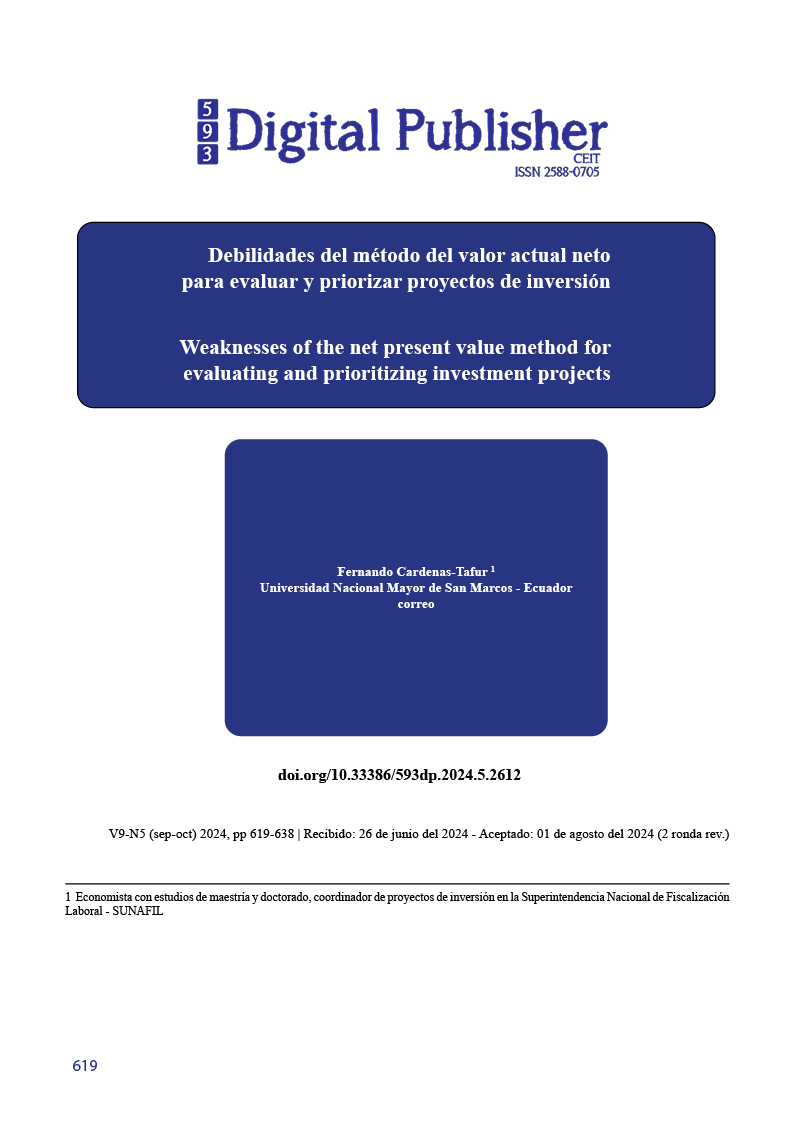Weaknesses of the net present value method for evaluating and prioritizing investment projects
Main Article Content
Abstract
The research aims to propose a new method of Net Present Value- NPV; It is not intended to replace it, on the contrary, it is sought to improve it and why not strengthen it based on scientific knowledge. The evaluator will be able to observe the result of the net present value in each of the periods and will be able to use the capital cost rates and the future reinvestment rate that they estimate for each project, at each moment and in each financial strategy.
The science of financial management has developed several models and conjectures to update fund flows and assign specific values to discount rates and thus be able to use net present value methods and others that update future values. However, all these models have inconsistencies, generally noted by their authors and expositors at the same time of justifying their models and/or theories.
The essence of the proposed method is to allow simulating the "financial reality of a project" in a more precise way than traditional methods, deciding the management of the project's benefits, by applying the capital cost rates (T.C.C.) and capitalization rate. future reinvestment (T.R.F.) that correspond at all times, in each company and according to its strategy. This allows us to separate the fraction of profits that will be used to return the investments from the rest of the profits that will be invested, at a future reinvestment rate. (which may be different for different projects).
Downloads
Article Details

This work is licensed under a Creative Commons Attribution-NonCommercial-ShareAlike 4.0 International License.
1. Derechos de autor
Las obras que se publican en 593 Digital Publisher CEIT están sujetas a los siguientes términos:
1.1. 593 Digital Publisher CEIT, conserva los derechos patrimoniales (copyright) de las obras publicadas, favorece y permite la reutilización de las mismas bajo la licencia Licencia Creative Commons 4.0 de Reconocimiento-NoComercial-CompartirIgual 4.0, por lo cual se pueden copiar, usar, difundir, transmitir y exponer públicamente, siempre que:
1.1.a. Se cite la autoría y fuente original de su publicación (revista, editorial, URL).
1.1.b. No se usen para fines comerciales u onerosos.
1.1.c. Se mencione la existencia y especificaciones de esta licencia de uso.
References
HERNANDEZ SAMPIERE, Roberto 2010 METODOLOGIA DE LA INVESTIGACION.Edit. Mc. Graw Hill. México. 2010
H. Peumans, 1972, Valoración de Proyectos de inversión, Edic. Deusto Bilbao.
James Mao,1986, Análisis Financiero, Editorial El Ateneo, Buenos Aires.
José A. Rejas Saal, 2001, “Matemática Financiera practica”, primera edición, Hipocampo publicistas SAC.
Salomón Ezra, 1969, “Teoría de Administración Financiera”, Editorial Macchi.
Mauricio M. Virreira Avila, 2020, Evaluación Financiera de Proyectos de Inversión Metodos y aplicaciones, dirección de post grado, Santa Cruz, Bolivia.
Álvaro Loscertales Alcaraz, 2019, Análisis de la estimación del wacc en la Valorización de empresas, comillas Universidad Pontificia, Facultad de CC. Económicas y Empresariales
Miky Gerónimo Ortiz Ramírez, 2014, Matemática Financiera, Editorial Macro.
Carlos Bresani, 2018-1, Matemática Financiera: Teoría y ejercicios, Facultad de ciencias empresariales y económicas, Universidad de Lima
James Andy Monge Jurado, agosto de 2016, Matemática Financiera, Universidad Continental, Primera edición
Manuel Chu Rubio, ediciones de la U, 2024, Finanzas Aplicadas, teoría y práctica 5Ta edición
Harvard Business Review, Reverte Management Internacional, 2021, Finanzas Básicas
Richard Brealey, Mcgraw Hill, 2020, Principios de Finanzas corporativas
Yoel Sardiñas, Spencer Hoffmann, 9 de abril, El secreto de aprender a invertir.
Salvador Durban Oliva, ediciones pirámide, 2020, Finanzas Corporativas.
Richard Brealey, Mcgraw Hill Education, 2023, Principios de Finanzas corporativas
Damián de la Fuente Sánchez, Montserrat Hernández Solís, Editorial Universitaria Ramon Areces, 2020, Ejercicio de Matemática de las Operaciones Financieras.
Ricardo SÁ Nchez Casanova; Ana MarÍ A Villamar Gavilanes, Editorial Académica Española · Tapa Blanda, 2021, Estrategia Didáctica Para la Asignatura Matemática Financiera
Pedro Castedo Bartolomé, Alberto Casillas Cuevas, editorial CEF, 2021, Matemáticas Financieras (a Través de los Exámenes del Banco de España)
Anibal Torre, Editorial Macro, 2022, Matemática Financiera, aplicando Excel
Arthur A. Jr. Thompson (Autor) · Mc Graw Hill · Tapa Blanda, 2023, Administración Estratégica. En Busca de la Ventaja Competitiva. Conceptos y Casos / Ed. 23


